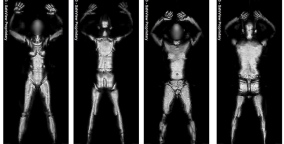Civil liberties groups are raising concerns about full-body scanners coming to Canadian airports.
The first Canadian full-body scanner was installed at Toronto’s Pearson airport last week, with more Canadian airports getting the machines in coming months. At Pearson, US-bound travellers singled out for extra screening may choose to undergo a pat-down body search or full-body scan.
But the BC Civil Liberties Association warns that full-body scans could become mandatory for all travellers, with no option of a pat-down instead. The BCCLA also notes that the technology is far from foolproof and the potential health impacts haven’t been sufficiently studied. While images captured by the scanners are supposed to be deleted after a passenger has passed through a security screening, the BCCLA says that security staff could take pictures of the scans with their own camera or cellphone.

Xtra reporter Dale Smith recently spoke to the NDP’s queer issues critic Bill Siksay about the scanners and the privacy concerns of trans people. Here’s what Siksay had to say:
“I’ve been
making inquiries with both the government and the Privacy Commissioner
as to what provision has been made around training folks who operate
this equipment and also just general policy around how transsexual and
transgendered folks are to be accommodated in those security searches….
It has a particular
implication for certain members of our community, so I want to pursue
that, and if we need to bring that to the standing [privacy] committee when it
gets back, then we’ll certainly try to do that.”
Earlier this month, the UK’s equality rights watchdog redflagged the government’s plan to implement full-body scanners. The UK Equality and Human Rights Commission says that counter-terrorism policies must be justifiable under the law:
“The Commission is concerned that that the proposals to introduce
body scanners are likely to have a negative impact on individual’s
rights to privacy, especially members of particular groups including
disabled people, older people, children, transgendered people, women and
religious groups. Under the Human Rights Act, any infringement of the
right to privacy must be justified, necessary and proportionate.“The proposals raise valid privacy concerns that the Commission and
the public hold around how intimate pictures are viewed and protected.
These include where the screening takes place; the sex of the person
doing the scanning; training and criminal checks on the operators; how
many other people are able to view the images; and how long they arekept for.”
 Why you can trust Xtra
Why you can trust Xtra


